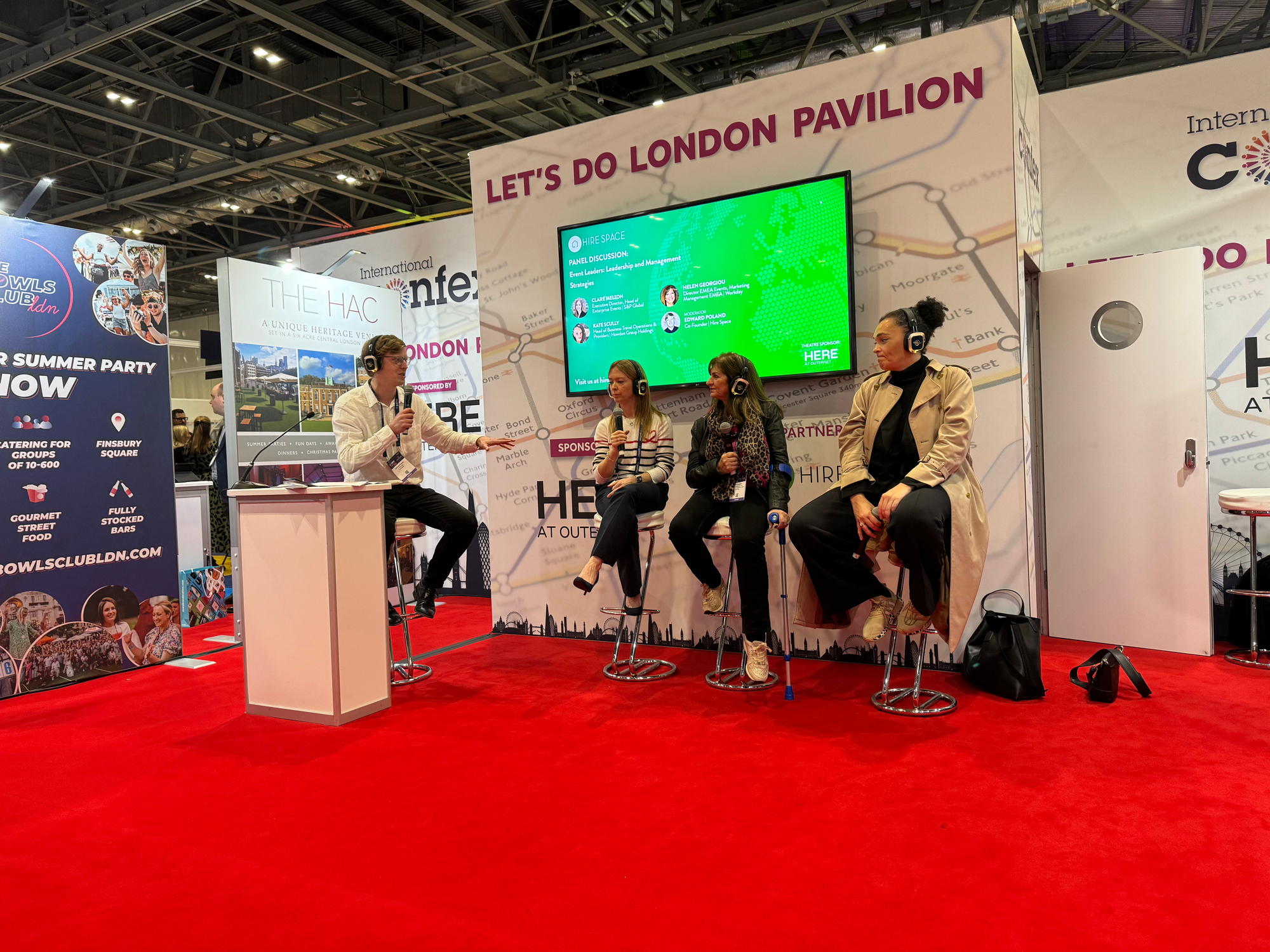Our Let's Do London stage at International Confex provided a comprehensive overview of what it takes to be a successful leader in events from some of the best in the industry including, Kate Scully, Head of Business Travel Operations and Providers at Howden Group Holdings, Helen Georgiou, Director EMEA Marketing Events at Workday, and Clare Melton, Executive Director, Head of Enterprise Events at S&P Global.
The panel discussion covered a range of topics, from the importance of cultural fit and communication to strategies for identifying and nurturing future leaders. Here are the essential insights and strategies our industry leader speakers shared during the panel.
Skills Event Leaders Need To Demonstrate
Event Leaders need to embody a blend of technical skills and interpersonal qualities to thrive. According to our panellists Helen and Clare, the most crucial attributes include integrity, trust, transparency, and a strong team culture. Given the demanding nature of event planning, which often involves long hours and high-pressure situations, the ability to foster a positive, people-first work environment is paramount. Leaders in this field must emphasise clear communication, adaptability, and a commitment to each team member's growth through regular 1-1 interactions.
Key Strategies:
- Foster a Positive Team Culture: Ensure that the team dynamics are built on mutual respect, understanding, and trust says Clare. Connect as people first rather than work first. Create a sense of belonging and inclusivity where everyone feels valued and supported.
- Emphasise Integrity and Trust: Lead by example by maintaining high standards of integrity and trustworthiness. This builds a transparent environment where team members feel secure and valued.
- Have Clear Communication: Adopt an open-door policy and communicate the company's culture clearly as an event leader. Embody the values you wish to see in your team, and ensure you are giving back yourself in return.
- Implement Regular 1-1's: Schedule weekly 1-1 meetings with each team member to address any concerns, provide personalised feedback, and support their individual growth. Helen suggested that this helps in understanding their aspirations and challenges, ensuring they feel heard and appreciated as individuals.
- Adaptability in Work Practices: Recognise that the way of working has evolved since the pandemic. Be open to adapting work practices to suit the changing needs of the team and the industry, especially in global or remote team settings.

Dealing with Stakeholders
Effective stakeholder management is pivotal in the events industry, where success relies on collaboration, understanding, and strategic communication. Insights from Helen, Clare, and Kate, emphasise the importance of proactive stakeholder engagement, championing your team's visibility, and deep industry knowledge. Events leaders must be proficient not only in organising impactful events but also in aligning these events with the business's broader objectives. This includes a thorough understanding of the company's market position, competitive landscape, and financial goals.
Key Strategies:
- Proactively Engage with Stakeholders: Schedule regular 1-1 meetings with key internal stakeholders and decision-makers to discuss your events' strategic value and impact on the business. They know that you as an event leader, generate business for them, so use these opportunities to build trust and align your events with their business objectives.
- Elevate Your Team's Contributions: Clare emphasised the importance of your role as a leader in championing your team. Ensure their efforts are recognised by stakeholders, actively showcasing their accomplishments and the significant value they contribute.
- Strategic Communication: Use industry comparisons, benchmarks, and analogies to make your points more relatable to stakeholders, speak the language they speak. Tailoring your communication in this way helps stakeholders understand the significance and potential impact of your events.
- Dive Deep: Immerse yourself in understanding your company's business model, market, and competitors. Speaking the language of business and finance enables you to make effective cases for your events and align them more closely with strategic goals.
- Quantify Event Success: Develop a clear framework for measuring the ROI of your events. There has to be an ROI to hold an event. Demonstrating how events contribute to business growth, brand engagement, and market positioning is crucial for ongoing stakeholder support.

Identifying Future Leaders in the Team
Identifying future leaders in the events industry involves recognising individuals who demonstrate exceptional adaptability, resilience, and a willingness to go beyond their job descriptions. According to Clare, Helen, and Kate, effective communication within the team, a broad understanding of the business, and proactive career development are crucial markers of leadership potential. Leaders should be involved in various aspects of the business, showcasing skills that extend beyond traditional event-planning roles. Being resilient, taking on new challenges, and continuously learning are key traits of emerging leaders. Additionally, understanding the importance of self-belief and overcoming imposter syndrome is essential for personal growth. Effective leaders are always on the lookout for rising stars, ready to provide guidance, create career roadmaps, and have proactive discussions about development opportunities.
Key Strategies:
- Foster Open Communication: Encourage a culture where team members feel comfortable sharing ideas, challenges, and successes. This environment helps in spotting individuals who naturally take the lead in discussions and problem-solving.
- Encourage Broad Skill Development: Look for team members who seek opportunities to learn and apply skills that fall outside their immediate job responsibilities. This willingness to explore and adapt is a key indicator of leadership potential.
- Being Resilient: Recognise and support individuals who show resilience in the face of challenges. Future leaders are those who can maintain composure and support others during stressful times.
- Develop Career Roadmaps: Work with your team to understand their career aspirations and develop personalised roadmaps. Regularly review these plans and provide feedback, guidance, and the resources needed to achieve their goals.
- Address Imposter Syndrome: Kate addressed the all-important imposter syndrome, and stated that some people don’t know their own talents. As a leader, you need to encourage them to reflect on their career and how they got there, believe in themselves, and have blind belief. Create an environment that supports self-reflection and fosters confidence.
- Spot and Support Rising Stars: Be vigilant in recognising team members who consistently go above and beyond, showing leadership potential. Clare highlights that as leaders in your company, you need to know everything, who your rising stars are, be able to plot career paths at any given time and have proactive conversations.

Discussing Bad Event Results with Stakeholders
Effectively communicating about bad metrics with stakeholders involves expectation setting, embracing failures as learning opportunities, and offering transparent solutions. Our panellists emphasised the importance of preparing stakeholders for all outcomes, acknowledging that not every aspect of an event will always go as planned. Kate highlighted that recognising failure is a pivotal part of growth, and having solutions and roadmaps is key to communicating bad results to stakeholders. Don’t panic if an event hasn't gone the right way and you’re worried about telling your stakeholders… “Failure isn't going to end you, it's how you recover from it”. Having transparency about what went wrong, understanding the broader context, and identifying external factors that may have influenced the outcomes is crucial to stakeholders says Clare.
Key Strategies:
- Set Clear Expectations Early: Before the event, clearly communicate potential challenges and realistic outcomes to stakeholders. This sets the stage for more understanding and constructive conversations should things not go as planned.
- Offer Solutions and Transparency: When presenting bad metrics to stakeholders, be honest about the situation but also come prepared with a plan for how to address the issue. This shows stakeholders your commitment to turning setbacks into opportunities for improvement. Look back to look forward!
- Analyse and Understand the Context: Take a step back and examine why certain metrics did not meet expectations. Consider both internal and external factors that may have contributed to the outcome. Having this understanding can help devise more effective strategies moving forward which stakeholders will want to see in a leader.
How Can Event Leaders Navigate Through Challenges Successfully
Effective leadership transcends merely managing tasks; it involves fostering a culture of trust, empowerment, and open communication. The panellists at our Let's Do London stage stressed the importance of avoiding micromanagement, changing mindsets, and treating team members with respect and humanity. Leaders should be open to feedback, including criticism about their leadership style, and recognise the importance of difficult conversations for growth. Transitioning from a manager's mindset to that of a leader is crucial for empowering teams and fostering a positive, productive work environment.
Key Strategies:
- Embrace Diversity and Inclusion: Actively seek and value diverse perspectives within your team. Avoid the trap of surrounding yourself with people who mirror your own thoughts and backgrounds, as this limits creativity and innovation. Kate highlights that we are naturally attracted to people like ourselves, so be broad and listen to your gut but also your bias.
- Shift from Micromanagement to Empowerment: Trust your team's abilities and empower them to take ownership of their work. Micromanagement stifles creativity; instead, provide guidance and support when needed to your team and trust them.
- Adopt a Leader’s Mindset: Transition your approach from managing tasks to leading people. Focus on inspiring, motivating, and guiding your team towards achieving collective goals.
- Being Open to Feedback: Build a culture where feedback is valued, including feedback on your leadership- even if it's difficult to hear! Honest and constructive communication can lead to mutual respect and continuous improvement.
- Facilitate Difficult Conversations for Growth: Don’t shy away from tough discussions. These conversations are essential for addressing issues, setting expectations, and providing constructive feedback that can spur personal and professional growth.

Looking Into The Future: What's Next For Event Leaders
The future of event planning and leadership is inherently uncertain, yet certain strategies can prepare leaders and their teams for the challenges and opportunities ahead. Helen reminds us of the fundamental need for human connection, as evidenced by the global experience of COVID-19, suggesting that regardless of technological advances, the essence of events will remain rooted in bringing people together. Kate highlights the role of new leaders and fresh ideas in shaping the future, with particular emphasis on areas like artificial intelligence and sustainability.
Key Strategies:
- Storm-Proofing Your Team: According to Clare, it is hugely difficult to predict the future of events and storm-proofing your team by becoming hugely adaptable is pivotal in tackling any unpredictable challenges later down the line.
- Embrace Organic Growth: Stay open to natural progress, allowing your team and strategies to evolve in response to industry trends and feedback.
- Prioritise Human Connection: Remember that at the heart of every event is the need for human interaction. Design your events to enhance and celebrate these connections, regardless of digital advancements.
- Welcome Fresh Perspectives: Be open to new ideas from emerging leaders and team members, especially around AI and sustainability practices. These insights can drive innovation and set new standards in the events industry.
- Learn from Every Level: Cultivate an environment where learning is mutual. Recognise that valuable lessons and innovative ideas can come from any team member, regardless of their position. Kate highlights it's a two-way street, don't be afraid to learn from your juniors.

Our fantastic panel on the Let's Do London stage highlighted that successful leadership in the events industry hinges on more than just expertise; it requires a dedication to fostering integrity, trust, and open communication within teams. We hope you enjoyed this insightful leadership piece and take on some invaluable advice from our senior industry leaders.
We had a great time at International Confex catching up with industry peers and listening to some fantastic content across the two days. We would also like to thank all of our amazing speakers who attended our panels! Take a look at our other content piece around Key Challenges for Corporate Event Planners and How to Overcome Them.
If reading about Confex has inspired you to start planning your own events, get in touch below!
Authors

Gemma Baker
Gemma loves all things social media and keeps busy by creating lots of Hire Space content. When she’s not creating content, you'll find her shopping, exploring or at the gym!

Kate Scully
13 years + experience building and managing corporate travel and meetings programmes with global footprints and multi million dollar category spend.

Clare Melton
Clare is the Executive Director and head of Enterprise Events & Strategic Partnerships at S&P Global, with 23 years of strategic and operational experience.

Edward Poland
Co-founder of Hire Space. Making event planning a joy with the UK’s leading live venue marketplace.



